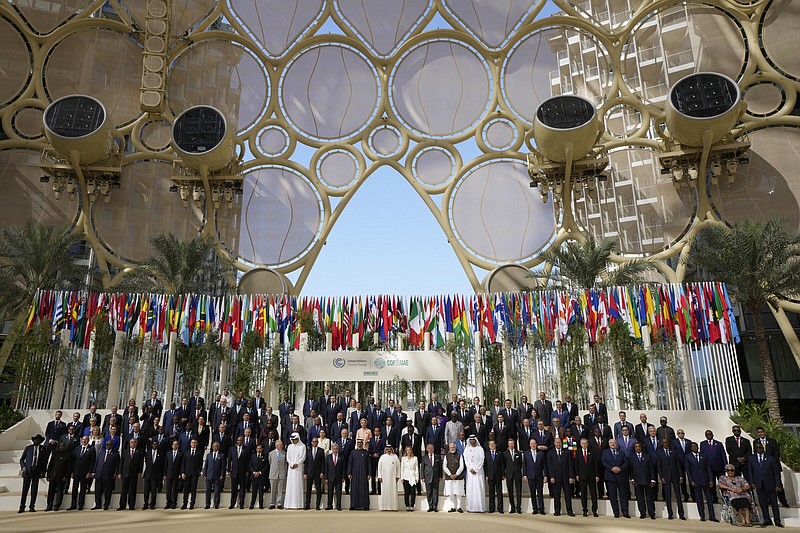DUBAI, United Arab Emirates -- Dozens of world leaders said they know the planet's dangerously overheating and they are trying to keep it from getting worse. The next step is to turn their soaring rhetoric voiced at the beginning of the United Nations climate conference into action.
In the first of two days of the two-week summit, presidents, prime ministers and royals from nations rich and poor trotted up to the microphone Friday to lay out commitments to reduce how much their countries spew heat-trapping gases and asked their colleagues to do better.
Critics, advocacy groups and even some leaders themselves said that the words of promise must be followed by deals hammered out by diplomats in the coming days.
The conference, called COP28, is a who's who of about 150 of Earth's top decision-makers -- except the two most powerful men: Presidents Joe Biden and Xi Jinping of the United States and China. The leaders of the two most carbon-polluting nations were glaringly absent.
In a fire-and-brimstone kickoff of the parade of VIPs, U.N. Secretary-General Antonio Guterres, fresh from melting glaciers in Antarctica and Nepal, said "Earth's vital signs are failing" and told leaders, "you can prevent planetary crash and burn."
He referred to inequality and conflicts, mentioning the return of fighting between Israel and Hamas on Friday.
"Climate chaos is fanning the flames of injustice," Guterres said. "Global heating is busting budgets, ballooning food prices, upending energy markets and feeding a cost-of-living crisis. Climate action can flip the switch."
Jordan's King Abdullah said it was impossible to separate climate change from the war in Gaza.
"Climate threats magnify the devastation of war," the king said. "Let's be inclusive of the most vulnerable Palestinians severely impacted by the war."
Still, Kenyan President William Ruto said, "climate change stands out by far as the defining issue of our era." He joined many leaders who repeated the major goals of conference organizers to triple renewable energy and double energy efficiency.
Those goals aren't contentious, but what to do about fossil fuels is.
Guterres, a long-time critic of oil, gas and coal use that is causing climate change, fired his strongest shots yet against the industry, which includes COP28 host country United Arab Emirates, saying, "we cannot save a burning planet with a firehose of fossil fuels."
In a direct challenge to fossil fuel-aligned nations, the U.N. chief said the only way to limit warming to the goal set in 2015 in Paris -- 2.7 degrees Fahrenheit since the start of the industrial era -- requires eliminating oil, coal and gas use. "Not reduce, not abate. Phase out," he said.
The conference president on Friday issued a document calling for a "phase-down" of fossil fuels, which experts say is less than a phase-out. But 106 nations in Africa, Europe, the Caribbean and in the Pacific signed a statement calling for a full exit. It's up to the more than 190 countries in the talks to come up with an agreement everyone can be happy with, said conference Director General Majid Al Suwaidi.
That exposed the traditional fault lines between rich, industrialized countries and much of the developing world -- and between pledges and political action.
"Although we've made great progress together, the world is just not moving fast enough," said British Prime Minister Rishi Sunak. He said "major emitters" must speed up delivery of their promises, "and we must address the disconnect between lofty rhetoric on stages like this and the reality of people's lives around the world," he added.
Sunak has approved new North Sea oil drilling and pushed further into the future a planned ban in Britain on sales of new gas and diesel cars. He says he's still committed to the U.K.'s goal of reaching net zero carbon emissions by 2050, but is taking a "pragmatic" approach that does not unfairly hit taxpayers -- ahead of a possible election next year.
President Luiz Inacio Lula da Silva of Brazil, home to most of the Amazon rainforest, said "the planet is tired of climate agreements that were not fulfilled" and said he's had enough of "eloquent and empty speeches."
Lula called for climate justice for poorer nations that didn't cause the problem and railed against $2 trillion spent on weapons last year when the money should be spent on fighting hunger and climate change. He said Brazil will stop Amazon deforestation by 2030.
Information for this article was contributed by David Keyton, Sibi Arasu, Jill Lawless and Mari Yamaguchi of The Associated Press.
